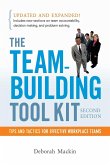The Cambridge Handbook of Workplace Training and Employee Development
Herausgeber: Brown, Kenneth G.
The Cambridge Handbook of Workplace Training and Employee Development
Herausgeber: Brown, Kenneth G.
- Gebundenes Buch
- Merkliste
- Auf die Merkliste
- Bewerten Bewerten
- Teilen
- Produkt teilen
- Produkterinnerung
- Produkterinnerung
This handbook presents workplace training, employee development, and organizational learning from the primary point of view of industrial organizational psychology.
Andere Kunden interessierten sich auch für
![The Cambridge Handbook of Intercultural Training The Cambridge Handbook of Intercultural Training]() The Cambridge Handbook of Intercultural Training252,99 €
The Cambridge Handbook of Intercultural Training252,99 €![Cambridge Handbook of Institutional Investment and Fiduciary Duty Cambridge Handbook of Institutional Investment and Fiduciary Duty]() Cambridge Handbook of Institutional Investment and Fiduciary Duty136,99 €
Cambridge Handbook of Institutional Investment and Fiduciary Duty136,99 €![Cambridge Handbook of Organizational Project Management Cambridge Handbook of Organizational Project Management]() Cambridge Handbook of Organizational Project Management144,99 €
Cambridge Handbook of Organizational Project Management144,99 €![The Team-Building Tool Kit The Team-Building Tool Kit]() Deborrah MackinThe Team-Building Tool Kit18,99 €
Deborrah MackinThe Team-Building Tool Kit18,99 €![Keeping Employees Accountable for Results Keeping Employees Accountable for Results]() Brian Cole MillerKeeping Employees Accountable for Results20,99 €
Brian Cole MillerKeeping Employees Accountable for Results20,99 €![Waterloo Area's Top Employers Waterloo Area's Top Employers]() Waterloo Area's Top Employers20,99 €
Waterloo Area's Top Employers20,99 €![Effect of Training and Development on the Performance of Employees Effect of Training and Development on the Performance of Employees]() Adam IddrisuEffect of Training and Development on the Performance of Employees49,99 €
Adam IddrisuEffect of Training and Development on the Performance of Employees49,99 €-
-
-
This handbook presents workplace training, employee development, and organizational learning from the primary point of view of industrial organizational psychology.
Hinweis: Dieser Artikel kann nur an eine deutsche Lieferadresse ausgeliefert werden.
Hinweis: Dieser Artikel kann nur an eine deutsche Lieferadresse ausgeliefert werden.
Produktdetails
- Produktdetails
- Verlag: Cambridge University Press
- Seitenzahl: 672
- Erscheinungstermin: 1. November 2017
- Englisch
- Abmessung: 260mm x 183mm x 40mm
- Gewicht: 1438g
- ISBN-13: 9781107085985
- ISBN-10: 1107085985
- Artikelnr.: 47739779
- Herstellerkennzeichnung
- Libri GmbH
- Europaallee 1
- 36244 Bad Hersfeld
- gpsr@libri.de
- Verlag: Cambridge University Press
- Seitenzahl: 672
- Erscheinungstermin: 1. November 2017
- Englisch
- Abmessung: 260mm x 183mm x 40mm
- Gewicht: 1438g
- ISBN-13: 9781107085985
- ISBN-10: 1107085985
- Artikelnr.: 47739779
- Herstellerkennzeichnung
- Libri GmbH
- Europaallee 1
- 36244 Bad Hersfeld
- gpsr@libri.de
1. Introduction and overview: now more than ever Kenneth G. Brown; Part I.
Fundamental Issues in Learning and Transfer: 2. Cognitive and neural
foundations of learning Kurt Kraiger and Victoria P. Mattingly; 3.
Facilitating the development of expertise: an individual to organizational
perspective Alena D. Marand and Raymond A. Noe; 4. Understanding training
transfer from the adaptive performance perspective Jason L. Huang, Shan Ran
and Brian D. Blume; 5. The psychology of learner control in training: a
multilevel, interactionist framework Garrett N. Howardson, Karin A. Orvis,
Sandra. L. Fisher and Michael E. Wasserman; Part II. Understanding the
Learner: 6. The role of abilities in learning and training performance
Margaret E. Beier, Anton J. Villado and Jason G. Randall; 7. Taking charge
of your own learning: self-regulation in training John J. Donovan and
Jessica M. Nicklin; 8. Effects of genuine and perceived demographic
differences in training and development Tracy C. McCausland and Eden B.
King; Part III. Designing the Intervention: 9. Enhancing training transfer
by promoting accountability in different work contexts: an integrative
framework Michael J. Tews and Lisa A. Burke-Smalley; 10. Building deep
specialization through intentional learning activities J. Kevin Ford,
Jessica Santoro and Morgan Showler; 11. The science and practice of
simulation-based training in organizations Shannon L. Marlow, Christina N.
Lacerenza, Denise Reyes and Eduardo Salas; 12. Augmented reality systems in
training Joseph R. Keebler, Brady S. Patzer, Travis J. Wiltshire and
Stephen M. Fiore; 13. One (lesson) for the road? What we know (and don't
know) about mobile learning Michael E. Wasserman and Sandra L. Fisher; 14.
Time and thinking: an alternative to traditional learning and development
activities Gillian B. Yeo and Sharon K. Parker; 15. Developing Latino
talent Miguel A. Quiñones; Part IV. Special Topics: 16. Training and
development in small and medium enterprises Melissa S. Cardon and Stephen
D. Valentin; 17. Team training: knowing much, but needing to know much more
Erich C. Dierdorff and J. Kemp Ellington; 18. Developing cultural
intelligence Jana L. Raver and Linn Van Dyne; 19. Implications of positive
organizational behavior and psychological capital for learning and training
effectiveness Alan M. Saks and Jamie A. Gruman; 20. Rings of fire: training
for systems thinking and broadened impact Anders Dysvik, Arne Carlesen and
Miha kerlavaj; 21. Rockstar vs ringmaster: balancing complimentary
teaching roles to develop management skills Peter A. Heslin, Geoff
Mortimore and Lauren A. Keating; Part V. Workplace Learning from Other
Lenses: 22. Training from the perspective of human resource development and
industrial-organizational psychology: common pasts, parallel paths - going
where? Jon M. Werner; 23. Strategic training and development and their role
in shaping competitive advantage Lynn A. McFarland and Robert E. Ployhart;
24. Hospitality training research: a review and implications for future
research J. Bruce Tracey; 25. Informal learning Saul Carliner; 26. An
operations management perspective on employee training and workforce
planning Barrett W. Thomas, Mike Hewitt and Scott E. Grasman; 27. Workplace
training from the sociological perspective David B. Bills and Herman van de
Werfhorst; Index.
Fundamental Issues in Learning and Transfer: 2. Cognitive and neural
foundations of learning Kurt Kraiger and Victoria P. Mattingly; 3.
Facilitating the development of expertise: an individual to organizational
perspective Alena D. Marand and Raymond A. Noe; 4. Understanding training
transfer from the adaptive performance perspective Jason L. Huang, Shan Ran
and Brian D. Blume; 5. The psychology of learner control in training: a
multilevel, interactionist framework Garrett N. Howardson, Karin A. Orvis,
Sandra. L. Fisher and Michael E. Wasserman; Part II. Understanding the
Learner: 6. The role of abilities in learning and training performance
Margaret E. Beier, Anton J. Villado and Jason G. Randall; 7. Taking charge
of your own learning: self-regulation in training John J. Donovan and
Jessica M. Nicklin; 8. Effects of genuine and perceived demographic
differences in training and development Tracy C. McCausland and Eden B.
King; Part III. Designing the Intervention: 9. Enhancing training transfer
by promoting accountability in different work contexts: an integrative
framework Michael J. Tews and Lisa A. Burke-Smalley; 10. Building deep
specialization through intentional learning activities J. Kevin Ford,
Jessica Santoro and Morgan Showler; 11. The science and practice of
simulation-based training in organizations Shannon L. Marlow, Christina N.
Lacerenza, Denise Reyes and Eduardo Salas; 12. Augmented reality systems in
training Joseph R. Keebler, Brady S. Patzer, Travis J. Wiltshire and
Stephen M. Fiore; 13. One (lesson) for the road? What we know (and don't
know) about mobile learning Michael E. Wasserman and Sandra L. Fisher; 14.
Time and thinking: an alternative to traditional learning and development
activities Gillian B. Yeo and Sharon K. Parker; 15. Developing Latino
talent Miguel A. Quiñones; Part IV. Special Topics: 16. Training and
development in small and medium enterprises Melissa S. Cardon and Stephen
D. Valentin; 17. Team training: knowing much, but needing to know much more
Erich C. Dierdorff and J. Kemp Ellington; 18. Developing cultural
intelligence Jana L. Raver and Linn Van Dyne; 19. Implications of positive
organizational behavior and psychological capital for learning and training
effectiveness Alan M. Saks and Jamie A. Gruman; 20. Rings of fire: training
for systems thinking and broadened impact Anders Dysvik, Arne Carlesen and
Miha kerlavaj; 21. Rockstar vs ringmaster: balancing complimentary
teaching roles to develop management skills Peter A. Heslin, Geoff
Mortimore and Lauren A. Keating; Part V. Workplace Learning from Other
Lenses: 22. Training from the perspective of human resource development and
industrial-organizational psychology: common pasts, parallel paths - going
where? Jon M. Werner; 23. Strategic training and development and their role
in shaping competitive advantage Lynn A. McFarland and Robert E. Ployhart;
24. Hospitality training research: a review and implications for future
research J. Bruce Tracey; 25. Informal learning Saul Carliner; 26. An
operations management perspective on employee training and workforce
planning Barrett W. Thomas, Mike Hewitt and Scott E. Grasman; 27. Workplace
training from the sociological perspective David B. Bills and Herman van de
Werfhorst; Index.
1. Introduction and overview: now more than ever Kenneth G. Brown; Part I.
Fundamental Issues in Learning and Transfer: 2. Cognitive and neural
foundations of learning Kurt Kraiger and Victoria P. Mattingly; 3.
Facilitating the development of expertise: an individual to organizational
perspective Alena D. Marand and Raymond A. Noe; 4. Understanding training
transfer from the adaptive performance perspective Jason L. Huang, Shan Ran
and Brian D. Blume; 5. The psychology of learner control in training: a
multilevel, interactionist framework Garrett N. Howardson, Karin A. Orvis,
Sandra. L. Fisher and Michael E. Wasserman; Part II. Understanding the
Learner: 6. The role of abilities in learning and training performance
Margaret E. Beier, Anton J. Villado and Jason G. Randall; 7. Taking charge
of your own learning: self-regulation in training John J. Donovan and
Jessica M. Nicklin; 8. Effects of genuine and perceived demographic
differences in training and development Tracy C. McCausland and Eden B.
King; Part III. Designing the Intervention: 9. Enhancing training transfer
by promoting accountability in different work contexts: an integrative
framework Michael J. Tews and Lisa A. Burke-Smalley; 10. Building deep
specialization through intentional learning activities J. Kevin Ford,
Jessica Santoro and Morgan Showler; 11. The science and practice of
simulation-based training in organizations Shannon L. Marlow, Christina N.
Lacerenza, Denise Reyes and Eduardo Salas; 12. Augmented reality systems in
training Joseph R. Keebler, Brady S. Patzer, Travis J. Wiltshire and
Stephen M. Fiore; 13. One (lesson) for the road? What we know (and don't
know) about mobile learning Michael E. Wasserman and Sandra L. Fisher; 14.
Time and thinking: an alternative to traditional learning and development
activities Gillian B. Yeo and Sharon K. Parker; 15. Developing Latino
talent Miguel A. Quiñones; Part IV. Special Topics: 16. Training and
development in small and medium enterprises Melissa S. Cardon and Stephen
D. Valentin; 17. Team training: knowing much, but needing to know much more
Erich C. Dierdorff and J. Kemp Ellington; 18. Developing cultural
intelligence Jana L. Raver and Linn Van Dyne; 19. Implications of positive
organizational behavior and psychological capital for learning and training
effectiveness Alan M. Saks and Jamie A. Gruman; 20. Rings of fire: training
for systems thinking and broadened impact Anders Dysvik, Arne Carlesen and
Miha kerlavaj; 21. Rockstar vs ringmaster: balancing complimentary
teaching roles to develop management skills Peter A. Heslin, Geoff
Mortimore and Lauren A. Keating; Part V. Workplace Learning from Other
Lenses: 22. Training from the perspective of human resource development and
industrial-organizational psychology: common pasts, parallel paths - going
where? Jon M. Werner; 23. Strategic training and development and their role
in shaping competitive advantage Lynn A. McFarland and Robert E. Ployhart;
24. Hospitality training research: a review and implications for future
research J. Bruce Tracey; 25. Informal learning Saul Carliner; 26. An
operations management perspective on employee training and workforce
planning Barrett W. Thomas, Mike Hewitt and Scott E. Grasman; 27. Workplace
training from the sociological perspective David B. Bills and Herman van de
Werfhorst; Index.
Fundamental Issues in Learning and Transfer: 2. Cognitive and neural
foundations of learning Kurt Kraiger and Victoria P. Mattingly; 3.
Facilitating the development of expertise: an individual to organizational
perspective Alena D. Marand and Raymond A. Noe; 4. Understanding training
transfer from the adaptive performance perspective Jason L. Huang, Shan Ran
and Brian D. Blume; 5. The psychology of learner control in training: a
multilevel, interactionist framework Garrett N. Howardson, Karin A. Orvis,
Sandra. L. Fisher and Michael E. Wasserman; Part II. Understanding the
Learner: 6. The role of abilities in learning and training performance
Margaret E. Beier, Anton J. Villado and Jason G. Randall; 7. Taking charge
of your own learning: self-regulation in training John J. Donovan and
Jessica M. Nicklin; 8. Effects of genuine and perceived demographic
differences in training and development Tracy C. McCausland and Eden B.
King; Part III. Designing the Intervention: 9. Enhancing training transfer
by promoting accountability in different work contexts: an integrative
framework Michael J. Tews and Lisa A. Burke-Smalley; 10. Building deep
specialization through intentional learning activities J. Kevin Ford,
Jessica Santoro and Morgan Showler; 11. The science and practice of
simulation-based training in organizations Shannon L. Marlow, Christina N.
Lacerenza, Denise Reyes and Eduardo Salas; 12. Augmented reality systems in
training Joseph R. Keebler, Brady S. Patzer, Travis J. Wiltshire and
Stephen M. Fiore; 13. One (lesson) for the road? What we know (and don't
know) about mobile learning Michael E. Wasserman and Sandra L. Fisher; 14.
Time and thinking: an alternative to traditional learning and development
activities Gillian B. Yeo and Sharon K. Parker; 15. Developing Latino
talent Miguel A. Quiñones; Part IV. Special Topics: 16. Training and
development in small and medium enterprises Melissa S. Cardon and Stephen
D. Valentin; 17. Team training: knowing much, but needing to know much more
Erich C. Dierdorff and J. Kemp Ellington; 18. Developing cultural
intelligence Jana L. Raver and Linn Van Dyne; 19. Implications of positive
organizational behavior and psychological capital for learning and training
effectiveness Alan M. Saks and Jamie A. Gruman; 20. Rings of fire: training
for systems thinking and broadened impact Anders Dysvik, Arne Carlesen and
Miha kerlavaj; 21. Rockstar vs ringmaster: balancing complimentary
teaching roles to develop management skills Peter A. Heslin, Geoff
Mortimore and Lauren A. Keating; Part V. Workplace Learning from Other
Lenses: 22. Training from the perspective of human resource development and
industrial-organizational psychology: common pasts, parallel paths - going
where? Jon M. Werner; 23. Strategic training and development and their role
in shaping competitive advantage Lynn A. McFarland and Robert E. Ployhart;
24. Hospitality training research: a review and implications for future
research J. Bruce Tracey; 25. Informal learning Saul Carliner; 26. An
operations management perspective on employee training and workforce
planning Barrett W. Thomas, Mike Hewitt and Scott E. Grasman; 27. Workplace
training from the sociological perspective David B. Bills and Herman van de
Werfhorst; Index.








